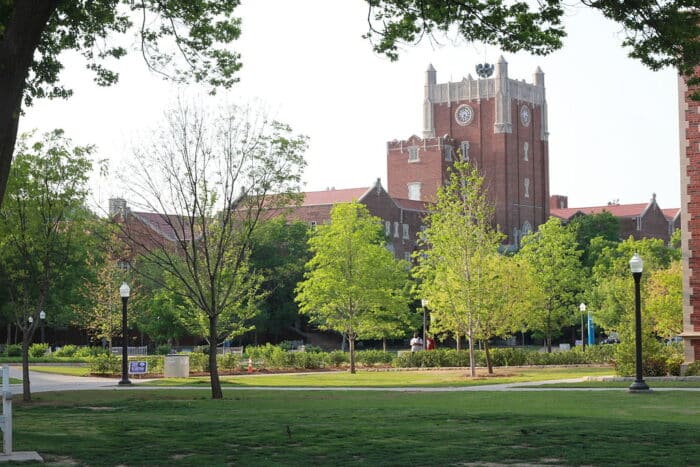For many students, choosing where to get their degree is already difficult. What can make it even more confusing is understanding the difference between a college and a university, as these two terms are often used interchangeably. While “college” is often used as a blanket term to describe any form of higher education, the truth is there are some key differences between colleges and universities, and to make an informed choice, students should really understand the distinctions.
If you’re looking to go back to school, definitely check out our other article on How to Choose a College- 10 Things you MUST Consider.
Ok, let’s dive in College vs University!
What Is a College?
The word “college” can be used to mean a variety of things. Sometimes the term refers to an institution that grants degrees very similar to a university. However, it can also refer to a school that offers short-term training that focuses on career-specific skills.
While not a strict rule, typically schools with “college” in their name are smaller institutions that emphasize undergraduate education. It’s also important to mention that under the umbrella term “college” there are different types of colleges:
Career Colleges
These institutions go by other names such as technical schools, trade schools, or vocational schools and provide job-oriented training that’s designed to prepare students to enter the workforce. Upon graduation, students will typically receive either a diploma, certificate, or associate degree. While most programs are completed in just two years, some career colleges also offer bachelor’s and master’s degree programs that can take three to four years to complete.
Typical programs offered at these colleges include occupations like business, design, healthcare, IT, culinary arts, HVAC repair and more.
Community Colleges
Sometimes called junior colleges, community colleges typically offer associate degrees, though some may also offer certificate programs, both taking two years to complete. Community colleges offer numerous benefits to students. Since they tend to be smaller than universities, they offer more intimate classes and interaction with instructors. And, because most community colleges have open admissions, anyone with a high school diploma or GED certificate can enroll.
An affordable tuition is also a big draw. Community colleges are far cheaper than 4-year institutions, often costing one-fourth what a 4-year school charges. Because of this, many students choose to start their education at a community college and then transfer to a traditional 4-year college or university to complete their bachelor’s degree.
Liberal Arts Colleges
Liberal arts colleges are four-year institutions that primarily focus on offering undergraduate programs that provide students with problem-solving, critical-thinking, and communication skills.
As for specific programs offered to students, they tend to be broader and range from history, languages, math and life sciences. These programs also have less variety in majors offered, generally speaking, and usually do not offer professional programs like medicine or engineering.
The majority of liberal arts colleges are private, though some public ones do exist. Typically, the students that graduate liberal arts colleges go on to obtain a master’s or doctoral degree at a 4-year university.
What Is a University?
Generally, the institutions that have “university” in their name are larger schools that offer a variety of both undergraduate and graduate degree programs. However, some universities are quite small. For instance, Marymount California University had a total enrollment of just 985 students in the fall of 2016, according to U.S. News data.
Some universities are public, while others are private.
Public universities are partly funded by state and local governments, and every state will have at least one state university. These institutions offer lower tuition fees to in-state students than to students that come from out of state. The idea being that families of in-state students have supported the university through taxes over the years, while out of state families have not.
Public universities tend to be sizable and sometime enroll tens of thousands of students. These school also tend to be committed to producing research.
Private universities do not receive government funding. Instead, they are financed through tuition fees, endowments, and private donations. Here, tuition fees tend to be higher than in public universities, but many private universities offer substantial financial aid to offset costs.
Private universities include some of the well-known Ivy League schools like Princeton University.
Research Universities vs. Teaching Universities
At most universities, faculty time will be split between teaching and research. However, the balance between these two endeavors can vary greatly between institutions.
As mentioned previously, those universities that emphasize research are usually larger, public institutions that offer a large variety of programs and majors at both undergraduate and graduate levels. Because these school place such an emphasis on research, they typically have state-of-the-art facilities such as extensive libraries and cutting-edge technology. They are also staffed by faculty members who are distinguished experts in their field.
It’s important to mention that most undergraduate students do not have access to these experts, as their classes are usually led by graduate teaching assistants rather than the professors themselves. These classes can also be, well, for lack of a better word, HUGE, with hundreds of students gathered in large lecture halls. It can certainly make it next to impossible to have any meaningful interaction with instructors. Something to keep in mind.
Conversely, teaching universities focus on teaching students rather than conducting research. Professors at these institutions typically have full teaching loads but still have time to dedicate to supporting and mentoring students.
RECAP: What Is the Difference Between Colleges and Universities?
Colleges are often smaller institutions that focus on offering the student body undergraduate degrees in a broad range of academic areas. Universities are typically larger, though not always, and offer a variety of both undergraduate and graduate degree programs. Many universities, usually public universities, are committed to producing research.
Which Type of School Is Right for You?
Hopefully you have a better understanding of the fundamental differences between colleges and universities. But now you also know there are a variety of colleges and universities, and you may be wondering how to know which one is right for you.
Here are some things to keep in mind when deciding:
1. Determine Your Career Goals
What kind of future do you envision for yourself? Do you know the kind of career you’d like to pursue? If so, what kind of training does that career require?
You may not even need a degree for many high-paying and growing careers.
If you think career-focused training that gets you job-ready in a short amount of time makes the most sense for your goals, then a career program may be the right choice. If you’ve determined that a bachelor’s degree is necessary for your dream career, but you want to get your degree in a cost-effective manner, then starting your education at a community college and transferring to a 4-year institution down the road may make the most sense.
Speaking of saving money, we’ll tell you exactly how you could SAVE BIG on your tuition and get your degree in the shortest amount of time possible!
2. Take a Realistic Look at Your Academic Record
It’s important to look at your course grades and test scores over the years to understand where you could reasonably expect to be admitted. You’ll find that admission requirements vary among colleges and universities, but a majority expect a certain level of academic achievement. Also keep in mind that competition for slots at the most popular institutions can be fierce.
If you determine your academic record doesn’t meet the requirements of many 4-year institutions, consider applying to a community college or career college, which typically have open admissions. Meaning anyone who has obtained a high school diploma or GED is eligible to enroll.
Or, look into career certifications where you can begin working in the field right away without having to worry about prior grades.
Again, if your goal is to eventually get your bachelor’s degree but your grades aren’t where you’d like them to be, then spending a couple of years at a community college can help prepare you to eventually transfer.
3. What’s Your preferred Learning Style?
As we previously mentioned, the size of classes in a college can vary greatly to those at a public university. An undergraduate class in a public university, for instance, could have 200+ students, while a class at a small liberal arts college could have only 20.
If you know that you want one-on-one attention from teachers, you’ll definitely want to focus on colleges that offer smaller class sizes.
Conversely, if you’ve always been an independent learner that is comfortable with self-directed study and you like the idea of having access to experts in your chosen field, a large research university may be perfect!
4. Think About Your Ideal Overall College Experience
Besides coursework, there are other aspects to college life like housing and campus culture.
Most 2-year colleges don’t offer housing, whereas most four-year colleges and universities do offer students the chance to live on campus. Which do you think you’d prefer?
Do you like the idea of being immersed in campus culture 24/7? If so, then a 4-year university may suit you best. If you don’t like the idea, or you’re an adult learner with a family, then career colleges and community colleges may better align with your needs.
Online degrees are another great option for adult learners who don’t want to commute to school. Take a look at our Top Tips for Choosing a College article.
Another factor in the college experience is extracurricular activities. Most 2-year colleges make it next to impossible to get involved in things like clubs. But students at 4-year schools have the opportunity to be much more involved in clubs and professional associations, sports and fraternities and sororities.
5. Review College Application Deadlines
As if it’s not hard enough choosing the right college for your career goals, it gets even more complicated when you have to factor in application deadlines. Essentially this is what you need to know: There are typically 4 different application deadline options and each school has their own enrollment window. So you may have your heart set on one school only to find out later that their application process throws a major wrench into your plans!
Be sure to really research schools to determine well in advance what their specific application deadline is.
Still have questions about the college application process? Check out our blog post “When are College Applications Due?”
6. Assess Your Finances
How much can you realistically afford to spend on your education? It’s one of the biggest questions prospective students and their families ask. Community colleges and trade schools are going to be far cheaper to attend than a 4-year university. This is why many students decide to begin their higher learning at a 2-year school and then transfer credits to a 4-year school to earn their bachelor’s.
But wait! You may be able to….
If you REALLY want to know how you can save on tuition, keep reading! We’ll share some secrets that could help you save THOUSANDS on getting your degree!
Wrap Up
As you can see, there are some key differences between colleges and universities, and both come with advantages and disadvantages. The key to choosing the right school for you is to know your overall goals, your academic record, budget and learning style. Don’t rush your decision-making process. You want to set yourself up for success and choose a school that will help you reach your goals.
How to Save Thousands on Your Education
If you are an adult learner, you may be focusing on choosing a school based on your finances. It’s not easy getting your degree when you potentially have a family and other financial responsibilities.
This is exactly why OnlineDegree.com was created. Our mission is to make higher learning affordable and accessible for everyone.
Students can take as many college-level courses as they’d like for FREE. Yep, you read that right, 100% FREE.
You can study at your own pace, at home, and never have to miss any important family events or work functions. We offer courses in a variety of areas such as marketing, computer programming, psychology, education, and much more.
That’s the good news. Now here’s the GREAT news!
We’ve gone ahead and built relationships with some of the top accredited colleges and universities around the country that could give you credit for the free courses you’ve completed. Not only does this give you the ability to save thousands on your degree, it also allows you to potentially earn your degree much faster. We’ve worked hard to make our courses super interesting, and the ability for those to apply as requirements toward your general education, elective, or degree-specific courses.
You can sign up for free in as little as 60 seconds. Find out exactly how you can save and learn.
What if you are an adult learner that wants to save big AND earn their education in as little time as possible so you can enter the job market quickly?
That’s where certification training comes in!
What is Certification Training?
Career certification is a fast-track to a career you love, that pays well and that can lead to future advancement. We realize that not every student has the time or budget to earn a 4-year degree. With career certification, you can obtain the necessary skills to enter the job market quickly and at a fraction of the cost of a traditional college degree.
Guess what?
We have also partnered with institutions that offer certificate training so you can get started on your dream career in as little as 6 months!
We’ve Made it Easy for You to Find the Right Certificate Program!
We realize busy adults hardly have the time to research colleges and universities to find ones that offer all awesome programs, big discounts and externships that will help get you noticed. That’s why we’ve gone ahead and saved you time by doing the research for you!
So here’s what you should do next: Check out the career certifications
Related Articles
-
How to Be Successful in College in 2022 – 7 Simple Tips to Succeed
-
How Do Scholarships Work? Read This First…Truth is Shocking
-
7 Best College Majors 2024: What Should I Major In?
-
How to Choose a College – 10 Things You Must Consider in 2024
-
Why Go to College? Top 13 Benefits for Adult Students in 2022
-
Top 5 Best Alternatives to Community College for 2024












